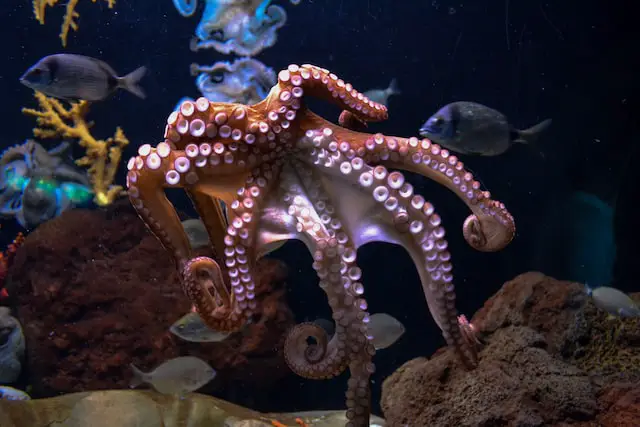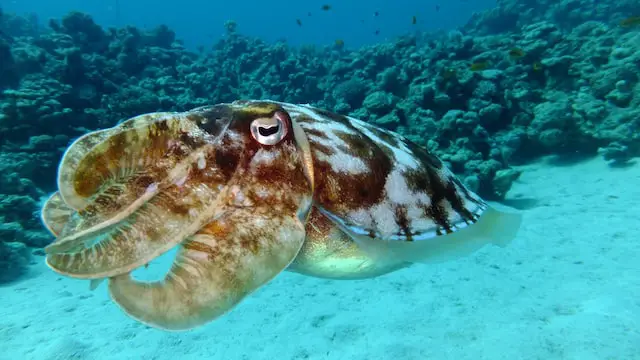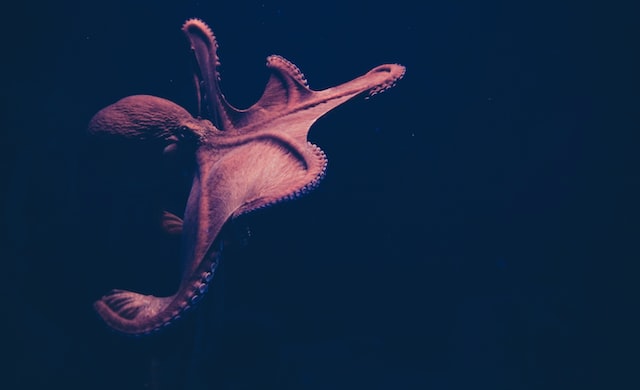Octopuses have eight arms with suckers along them whereas squids have eight short arms and two longer tentacles. Squid also tend to be faster swimmers than octopuses due to their larger fins. Squids also generally live closer to the surface of the ocean while octopuses inhabit many different depths. Although both creatures look similar, they display some major differences when it comes to behaviour, anatomy, habitat and diet.
What is an octopus?
(Photo by Serena Repice Lentini on Unsplash )

An octopus is a cephalopod mollusc of the order Octopoda. Around 300 species are recognised, which is over one-third of the total number of known cephalopod species. The octopus inhabits diverse regions of the ocean, including deep sea and coral reefs. They are commonly found in tropical waters.
What is a squid?
(Photo by Peter Boshra on Unsplash )

A squid is a marine cephalopod mollusc with a distinctive internal shell. They are similar in appearance to an octopus, but have a more compact body and tend to be much faster and more agile. Squid can range in size from just a few centimeters to over six meters in length!
Octopus Vs. Squid – Key differences
Octopuses and squids are both cephalopods, which are a group of marine animals known for their complex brains, advanced nervous systems, and ability to change color and shape to blend in with their surroundings. While octopuses and squids share many similarities, there are also several key differences between the two.
One of the most noticeable differences between octopuses and squids is their body shape. Octopuses have a rounded, bulbous body with eight arms, while squids have a more elongated body with eight arms and two tentacles. The arms of an octopus are typically longer and more flexible than those of a squid, and they lack the small, circular suction cups that are present on squid arms. Instead, octopuses have rows of suction cups that can be used to grasp and manipulate objects.
Another difference is that squids have two long tentacles that are used for catching prey, while octopuses lack true tentacles and instead have eight arms that are used for both locomotion and grasping prey. Also squids are generally larger than octopuses, with some species of squid reaching lengths of over 40 feet, while most octopuses are less than 1 meter in length.
Octopuses are generally solitary creatures that spend most of their time hiding in crevices or burrows on the ocean floor. Squids are more social and often travel in schools.
Both octopuses and squids are known for their ability to change color and shape to blend in with their surroundings, but they have different defense mechanisms as well. Octopuses can release a cloud of ink to confuse predators, while some species of squid can release a bright burst of bioluminescent light to startle and distract predators.
The difference in habitat
An octopus and a squid may look similar, but they have some key differences in their habitat. For one, octopuses live in warmer waters than squids. They can be found in tropical and temperate regions, while squids are mostly found in cold waters. Octopuses also tend to live at shallower depths than squids—they’re commonly found in reefs and tide pools, while squids are found in the open ocean.
Additionally, octopuses are more solitary creatures than squids. They often live alone in dens that they excavate from the seafloor, while squids tend to live in groups called shoals. And finally, octopuses are not as long-lived as squids—they typically only live for about 1-5 years, while squids can live for up to 10 years or more.
The difference in diet
The main difference between an octopus and a squid is their diet. Octopuses are carnivores, while squid are mostly herbivores. This means that octopuses eat mostly meat, while squid eat mostly plants.
Octopuses are predators and will typically eat whatever they can catch. Their diet includes fish, crabs, shrimp, and other small animals. Squid, on the other hand, are mostly herbivores and feed on plankton and other small organisms.
Is calamari a squid or octopus?
Calamari is a culinary term that refers to a dish made from squid. Squid are sometimes also called calamari in English, and they are a common ingredient in many cuisines around the world. Octopus is a different type of cephalopod, and it is not typically referred to as calamari. So, in short, calamari is a dish made from squid, not octopus.
Octopus meat is called “tako” in Japanese. It is also called “octopus” in English. Squid meat is called “ika” in Japanese.
Are octopus and squid in the same family?
Most people don’t know that octopus and squid are actually in the same family. Both creatures are mollusks, which is a large group of invertebrates that includes snails, slugs, and clams. There are over 85,000 different species of mollusks!
The scientific name for octopus is Octopoda, and there are about 300 different species. Squid’s scientific name is Teuthida, and there are about 300 different species. That means there are about 600 different types of octopus and squid combined!
While both animals have eight arms (hence their names), squids also have two long tentacles. Octopuses use their arms for walking on the ocean floor, but squids use their tentacles for catching prey. Both creatures have suction cups on their arms/tentacles to help them move around and catch food.
Octopuses are mostly solitary creatures, while squids often travel in groups. Another difference is that octopuses can change the color of their skin to match their surroundings (camouflage), but squids cannot.
What is the size of the largest squid?
The size of the largest squid is a matter of some debate, as these elusive creatures are not well studied in the wild and tend to inhabit the deep ocean, far from human observation. However, based on the available evidence, it is generally believed that the largest species of squid is the giant squid (Architeuthis dux), which can grow to enormous sizes.
Giant squid are believed to be the largest invertebrates in the world, with the largest specimens estimated to reach lengths of up to 43 feet (13 meters) and weights of over 600 pounds (275 kg). However, due to their elusive nature, only a few specimens of giant squid have ever been reliably measured or observed in the wild, so these estimates are somewhat uncertain.
In recent years, scientists have used remote cameras and other advanced technologies to capture rare footage of giant squid in their natural habitat, shedding new light on these mysterious creatures. While much remains to be learned about these giant cephalopods, their immense size and otherworldly appearance have made them a subject of fascination and intrigue for scientists and the public alike.
What is the size of the largest octopus?
The size of the largest octopus species is also a matter of some debate, but it is generally agreed that the Giant Pacific Octopus (Enteroctopus dofleini) is the largest species of octopus. These impressive creatures can be found in the North Pacific Ocean, ranging from California to Japan, and can grow to very large sizes.
The Giant Pacific Octopus is known for its size and strength, with some specimens estimated to weigh over 150 pounds (68 kg) and have arms that can span over 20 feet (6 meters) in length. However, size can vary greatly among individuals, with most adult specimens measuring between 9 to 16 feet (2.7 to 4.9 meters) in arm span.
Like other octopus species, the Giant Pacific Octopus has a highly intelligent and adaptable nature, with the ability to solve problems, manipulate objects, and change color and texture to blend in with its environment. These impressive cephalopods are also known for their ability to squeeze through small openings and crevices, and for their powerful suckers, which allow them to cling to rocks and other surfaces in strong currents.
Can octopus and squids sink ships and boats?
There is a common myth that octopuses and squids can sink ships and boats by wrapping their tentacles around the vessels and pulling them under the water. However, this is not true.
While cephalopods like octopuses and squids are powerful and agile swimmers with a strong grip, they do not have the physical strength or suction power to pull a ship or boat underwater. In addition, cephalopods are generally found in deep ocean waters, far from the surface where ships and boats operate.
There have been rare instances where cephalopods have caused damage to boats, such as when they become entangled in fishing nets or accidentally collide with vessels. However, these incidents are not typically associated with deliberate attacks on ships or boats.
Why does the octopus have blue blood?
The octopus has blue blood because it uses a copper-containing protein called hemocyanin to transport oxygen throughout its body. Hemocyanin is similar to the iron-containing protein hemoglobin found in the red blood cells of humans and many other animals, but instead of carrying oxygen in red blood cells, hemocyanin carries oxygen in the octopus’s blood plasma.
Hemocyanin contains copper atoms that bind to oxygen molecules, giving the octopus’s blood a bluish color. This is in contrast to hemoglobin, which contains iron atoms that bind to oxygen, giving human blood a red color. The blue color of the octopus’s blood is most visible in the veins of their arms, where the blood is closest to the surface.
The use of hemocyanin by the octopus and other cephalopods is an adaptation to their marine environment. Hemocyanin is more efficient than hemoglobin at transporting oxygen in cold, low-oxygen environments, such as the deep ocean where many cephalopods live. This allows the octopus to survive in environments where other animals would struggle to get enough oxygen from the water.
Featured Image By – Photo by Isabel Galvez on Unsplash








